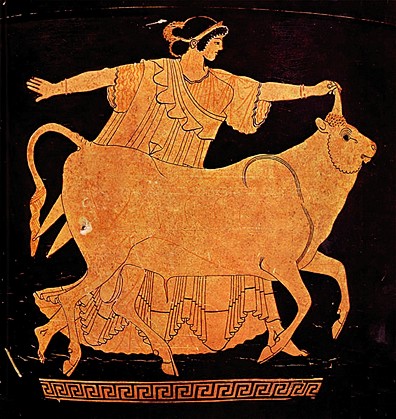Lessico
Radamanto

Europa
madre di Radamanto
Zeus si trasformò in toro per accostarla e la rapì portandola in groppa
Radamanto
(anche Radamante; in greco Rhadámanthys)
è il nome di un'antichissima divinità cretese, figlio di Zeus![]() e di
Europa, fratello di Minosse
e di
Europa, fratello di Minosse![]() (sotto il cui nome si svolse, nella dimensione
mitologica greca, tutta la civiltà di Creta
(sotto il cui nome si svolse, nella dimensione
mitologica greca, tutta la civiltà di Creta![]() ). Secondo
la mitologia greca, avendo ucciso suo fratello, Radamanto si recò a Calea, in
Beozia
). Secondo
la mitologia greca, avendo ucciso suo fratello, Radamanto si recò a Calea, in
Beozia![]() , dove
sposò Alcmena, vedova di Anfitrione
, dove
sposò Alcmena, vedova di Anfitrione![]() , e si
meritò la reputazione di legislatore sapientissimo.
, e si
meritò la reputazione di legislatore sapientissimo.
Secondo
Omero![]() (Odissea,
IV, 564) dimorava nei Campi Elisi (Isole dei Beati) e per questo fu considerato
Signore del mondo ultraterreno. In Platone
(Odissea,
IV, 564) dimorava nei Campi Elisi (Isole dei Beati) e per questo fu considerato
Signore del mondo ultraterreno. In Platone![]() troviamo
una tradizione che fa di Radamanto, assieme a Eaco e Minosse, un giudice dei
morti. Quando gli antichi volevano esprimere un giudizio giusto, quantunque
severo, lo chiamavano "giudizio di Radamanto", proprio a significare
la sua grande equità. Nel Tartaro esso inquisiva sui delitti e li puniva,
obbligava i colpevoli a rivelare gli errori della loro vita e a confessare i
delitti la cui espiazione doveva avvenire dopo la morte. Radamantini erano i
giuramenti che si facevano invocando a testimoni animali o cose inanimate:
Socrate
troviamo
una tradizione che fa di Radamanto, assieme a Eaco e Minosse, un giudice dei
morti. Quando gli antichi volevano esprimere un giudizio giusto, quantunque
severo, lo chiamavano "giudizio di Radamanto", proprio a significare
la sua grande equità. Nel Tartaro esso inquisiva sui delitti e li puniva,
obbligava i colpevoli a rivelare gli errori della loro vita e a confessare i
delitti la cui espiazione doveva avvenire dopo la morte. Radamantini erano i
giuramenti che si facevano invocando a testimoni animali o cose inanimate:
Socrate![]() giurava
per il cane o per il papero, per la capra il filosofo greco Zenone (335-263
aC).
giurava
per il cane o per il papero, per la capra il filosofo greco Zenone (335-263
aC).
Sono
ricordati due suoi figli fondatori ed eponimi di città: Gortys di
Gortina (Creta) ed Erytros di Eritre (Beozia). Radamanto
è rappresentato seduto su un trono, con lo scettro in mano, sulla porta dei
Campi Elisi, a fianco di Saturno![]() .
.
In Greek myths, Rhadamanthus (Rhadámanthys in Greek, also transliterated as Rhadamanthys or Rhadamanthos) was a wise king, the son of Zeus and Europa. Later accounts even make him out to be one of judges of the dead. His brothers were Minos and Sarpedon. Minos was also a king and a judge of the dead. Rhadamanthus was raised by Asterion. He had two sons, Gortys and Erythrus.
According to one account, Rhadamanthus ruled Crete before Minos, and gave the island an excellent code of laws, which the Spartans were believed to have copied. Driven out of Crete by his brother, Minos, who was jealous of his popularity, he fled to Boeotia, where he wedded Alcmene. Homer represents him as dwelling in the Elysian Fields (Odyssey, iv. 564), the paradise for the immortal sons of Zeus.
According to later legends (c. 400 BC), on account of his inflexible integrity he was made one of the judges of the dead in the lower world, together with Aeacus and Minos. He was supposed to judge the souls of Asians, Aeacus those of Europeans, while Minos had the casting vote (Plato, Gorgias, 524A). Virgil (69 - 18 BC) makes Rhadamanthus one of the judges and punishers of the damned in the Underworld (Tartarus) section of The Aeneid. Pindar says that he is the right-hand man of Kronos (now ruling Elysium) and was the sole judge of the dead.
In another version, Minos, Sarpedon and Rhadamanthus quarrelled over a beautiful boy they were all in love with, by the name of Miletus, son of Apollo and Areia. The youth however preferred Sarpedon, so Minos in revenge went to war and conquered the whole island. Sarpedon and his beloved escaped to Lycia, where Miletus founded the city that bore his name. Other mythographers claimed that the beloved youth's name was Atymnios, and that he was the son of Zeus and Cassiopeia. (Apollodorus III.1.2)
Bernard Sergent claims that the story is a late invention in that the theme of competition for a beloved youth is not in keeping with the Cretan pederastic tradition, and there is no record of this Miletus prior to the second century BC.
Rhadamanthus also lends its name to the English word 'Rhadamanthine', an adjective describing any just but inflexible judgment. (The Aeneid, vi. 566) The Kuiper belt object 38083 Rhadamanthus is named after this figure. In Stephen King's Rose Madder, Rhadamanthus is the name of the white pony tied to the broken cart in Rosie's picture. In Diablo II, Radament (name obviously derived from the mythological figure) is a greater mummy that the player can slay to complete an optional quest. In the popular manga series Saint Seiya , Wyvern Rhadamanthys is the name of one of the generals of hades. In the Hyperion Cantos, Rhadamanth Nemes is sent after the main characters, encountering them on two occasions.